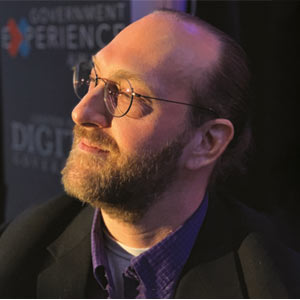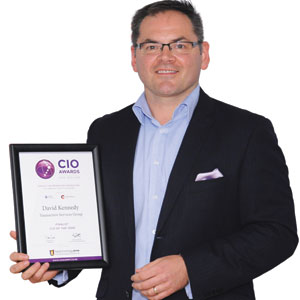THANK YOU FOR SUBSCRIBING

How Smart City Tech Is Moving from Pilot to Product
Dan Hoffman, City Manager at the City of Winchester, Virginia Local Government


Dan Hoffman, City Manager at the City of Winchester, Virginia Local Government
Dan Hoffman is an accomplished city manager with over a decade of innovative leadership experience. He spent three and a half years with the City of Winchester after serving as Assistant City Manager in Gainesville, Florida. Prior to that, Hoffman was the Chief Innovation Officer for Montgomery County, Maryland, establishing one of the nation’s first robust municipal innovation programs. As Winchester’s City Manager, Hoffman oversees all operations, including police, fire, parks, technology and public services. He leads almost 600 employees across multiple departments. With a focus on strategic policymaking, program development and technology implementation, Hoffman drives initiatives that enhance resident services year-round. His expertise spans communications, human resources, risk management, and business development, and he has over 10 years of experience in senior municipal roles.
Through this article, Hoffman highlights the evolution of smart city technologies becoming mainstream products, concerns around responsible tech use in policing and the need for strategic tech leadership, staffing and governance as budgets tighten.
What challenges do you encounter daily when it comes to technology implementation or deploying those new programs for your residents?
Over the past decade in leadership roles within the Smart Cities community, I have noticed we are reaching a point where many technologies we were developing, prototyping and piloting 10 years ago are now available as vendor products. We no longer need to test or pilot them extensively–we can often purchase them off the shelf. This was true with our recent Smart City implementation of intelligent traffic cameras from our partner ReCore. Their product didn’t exist a few years prior, but now we can directly implement it.
I see cities able to purchase and implement products without the rigorous testing and iteration prevalent 10 years ago. I am still a big proponent of piloting, prototyping and design thinking for technology rollouts in local government. However, we are shifting away from focusing solely on cyber-physical systems, IoT devices, and sensors already integrated into our operations.
The new frontier for testing and piloting seems to be in the software space—artificial intelligence and machine learning specifically. Like the early days of smart cities tech, many AI/ML products claim to deliver significant value. Our big challenge is determining what this new wave can genuinely accomplish for us without endangering our residents in any way.
What are the current project initiatives that you are working on?
Our biggest project is the intelligent transportation system. It uses advanced technologies to manage and optimize transportation networks. It integrates data from sensors, cameras and connected vehicles to monitor traffic flow, reduce congestion, enhance safety through automated detection of incidents and provide real-time travel information to commuters and agencies.
The other major initiative we’re working on is more of a traditional Smart City project, but it has roots going back to the transit world–our microtransit project. This leverages the same technologies the private industry has used for years to manage fleets and enable real-time trip planning and route optimization. We are now applying those capabilities to transit to create a more on-demand system. This is a huge shift for us. Traditionally, in transit, we have relied on paper schedules and big buses with fixed routes and drivers. Now, we are transitioning to an entirely new on-demand model enabled by technology.
This creates significant policy questions and concerns that we have been working through. But in less than a month, we will launch one of the first system-wide microtransit initiatives in Virginia, which we are very proud of. We are eager to get this new service online.
What does the future hold for the space? Are there any technological trends that might disrupt the space?
One of the bigger changes we are seeing is how cities, states, and federal rules are treating our ability to use technology in law enforcement settings. Anytime we introduce new technologies for policing, it raises a wide variety of questions related to privacy and even social justice concerns in some cases. Ensuring we deploy critical, potentially life-saving technologies in this arena without infringing on people’s rights or privacy is a major challenge on the horizon over the next five years.
There are a lot of powerful new tools and ways to catch and detect criminals emerging. We hope that state and federal regulations keep pace so we have access to the tools we need. If not, that will probably be one of the biggest hurdles for us over the next five to ten years–how do we responsibly incorporate all these new technologies into public safety operations? Navigating that is likely our foremost challenge on the road ahead.
While innovative capabilities can make communities safer, we have to be thoughtful about citizen protection. Striking that balance appropriately as technology evolves will be critical for local governments throughout the upcoming decade.
What advice would you offer to your fellow peers on how they can stay updated with the latest technology and implement it effectively?
We are living in an era where significant federal funding was pushed out to localities like Winchester and jurisdictions nationwide during the COVID period. But that money is running out, and our budgets are tightening up again after being able to invest heavily in new technologies. I encourage all my peers to ensure you adequately train your staff and actively recruit IT professionals into local government roles. We need the capability to implement and maintain these technologies in the long term successfully. Incorporate your technology team into all aspects of operations. Ensure your CIO works hand-in-glove with your police chief, fire chief, and transit director. Have a CIO ready and able to develop true operational partnerships.
Without centralized governance and oversight, we can no longer afford to allow senior staff and directors to make technology purchases. Make sure you have a collaborative CIO who is prepared to work directly with department leaders on technology strategy. With budgets tightening, we have to be smart about building internal expertise, breaking down silos and having strong IT leadership coordinating technology efforts across the organization. Those will be keys to sustaining our investments.
Weekly Brief
I agree We use cookies on this website to enhance your user experience. By clicking any link on this page you are giving your consent for us to set cookies. More info
Read Also













